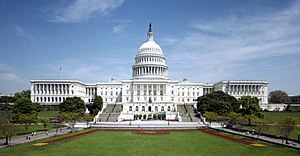 Image via Wikipedia
Image via WikipediaMany readers have reacted to my call for a higher standard for FAPE by saying that the law already provides a potential maximizing standard. They refer to the
Congressional findings in IDEA.
One legal point here. The courts rarely put any importance in the Congressional findings. They are largely considered symbolic efforts by our elected representatives. Why many of you have asked does Congress bother to stuff laws with nice sounding language that really doesn't do any good? I suggest that you ask your congressman. If you get a good answer, I'd love to hear it. Remember the old saw - there are two things that nobody such ever see being made: sausage and legislation. I apologize in advance to those who feel that this is an insult to sausage.
The following is a quote from IDEA regarding the Congressional findings. Tell me what you think,
(c) Findings.--Congress finds the following:
(1) Disability is a natural part of the human experience and in no way diminishes the right of individuals to participate in or contribute to society. Improving educational results for children with disabilities is an essential element of our national policy of ensuring equality of opportunity, full participation, independent living, and economic self-sufficiency for individuals with disabilities.
(A) the children did not receive appropriate educational services;
(B) the children were excluded entirely from the public school system and from being educated with their peers;
(C) undiagnosed disabilities prevented the children from having a successful educational experience; or
(D) a lack of adequate resources within the public school system forced families to find services outside the public school system.
(3) Since the enactment and implementation of the Education for All Handicapped Children Act of 1975, this title has been successful in ensuring children with disabilities and the families of such children access to a free appropriate public education and in improving educational results for children with disabilities.
(4) However, the implementation of this title has been impeded by low expectations, and an insufficient focus on applying replicable research on proven methods of teaching and learning for children with disabilities.
(5) Almost 30 years of research and experience has demonstrated that the education of children with disabilities can be made more effective by--
(A) having high expectations for such children and ensuring their access to the general education curriculum in the regular classroom, to the maximum extent possible, in order to--
(i) meet developmental goals and, to the maximum extent possible, the challenging expectations that have been established for all children; and
(ii) be prepared to lead productive and independent adult lives, to the maximum extent possible;
(B) strengthening the role and responsibility of parents and ensuring that families of such children have meaningful opportunities to participate in the education of their children at school and at home;
(C) coordinating this title with other local, educational service agency, State, and Federal school improvement efforts, including improvement efforts under the Elementary and Secondary Education Act of 1965, in order to ensure that such children benefit from such efforts and that special education can become a service for such children rather than a place where such children are sent;
(D) providing appropriate special education and related services, and aids and supports in the regular classroom, to such children, whenever appropriate;
(E) supporting high-quality, intensive preservice preparation and professional development for all personnel who work with children with disabilities in order to ensure that such personnel have the skills and knowledge necessary to improve the academic achievement and functional performance of children with disabilities, including the use of scientifically based instructional practices, to the maximum extent possible;
(F) providing incentives for whole-school approaches, scientifically based early reading programs, positive behavioral interventions and supports, and early intervening services to reduce the need to label children as disabled in order to address the learning and behavioral needs of such children;
(G) focusing resources on teaching and learning while reducing paperwork and requirements that do not assist in improving educational results; and
(H) supporting the development and use of technology, including assistive technology devices and assistive technology services, to maximize accessibility for children with disabilities.
(6) While States, local educational agencies, and educational service agencies are primarily responsible for providing an education for all children with disabilities, it is in the national interest that the Federal Government have a supporting role in assisting State and local efforts to educate children with disabilities in order to improve results for such children and to ensure equal protection of the law.
(7) A more equitable allocation of resources is essential for the Federal Government to meet its responsibility to provide an equal educational opportunity for all individuals.
(8) Parents and schools should be given expanded opportunities to resolve their disagreements in positive and constructive ways.
(9) Teachers, schools, local educational agencies, and States should be relieved of irrelevant and unnecessary paperwork burdens that do not lead to improved educational outcomes.
(A) The Federal Government must be responsive to the growing needs of an increasingly diverse society.
(B) America's ethnic profile is rapidly changing. In 2000, 1 of every 3 persons in the United States was a member of a minority group or was limited English proficient.
(C) Minority children comprise an increasing percentage of public school students.
(D) With such changing demographics, recruitment efforts for special education personnel should focus on increasing the participation of minorities in the teaching profession in order to provide appropriate role models with sufficient knowledge to address the special education needs of these students.
(A) The limited English proficient population is the fastest growing in our Nation, and the growth is occurring in many parts of our Nation.
(B) Studies have documented apparent discrepancies in the levels of referral and placement of limited English proficient children in special education.
(C) Such discrepancies pose a special challenge for special education in the referral of, assessment of, and provision of services for, our Nation's students from non- English language backgrounds.
(A) Greater efforts are needed to prevent the intensification of problems connected with mislabeling and high dropout rates among minority children with disabilities.
(B) More minority children continue to be served in special education than would be expected from the percentage of minority students in the general school population.
(C) African-American children are identified as having mental retardation and emotional disturbance at rates greater than their White counterparts.
(D) In the 1998-1999 school year, African-American children represented just 14.8 percent of the population aged 6 through 21, but comprised 20.2 percent of all children with disabilities.
(E) Studies have found that schools with predominately White students and teachers have placed disproportionately high numbers of their minority students into special education.
(A) As the number of minority students in special education increases, the number of minority teachers and related services personnel produced in colleges and universities continues to decrease.
(B) The opportunity for full participation by minority individuals, minority organizations, and Historically Black Colleges and Universities in awards for grants and contracts, boards of organizations receiving assistance under this title, peer review panels, and training of professionals in the area of special education is essential to obtain greater success in the education of minority children with disabilities.
(14) As the graduation rates for children with disabilities continue to climb, providing effective transition services to promote successful post-school employment or education is an important measure of accountability for children with disabilities.
IDEA §601(c)
 Image by Getty Images via @daylife
Image by Getty Images via @daylife














